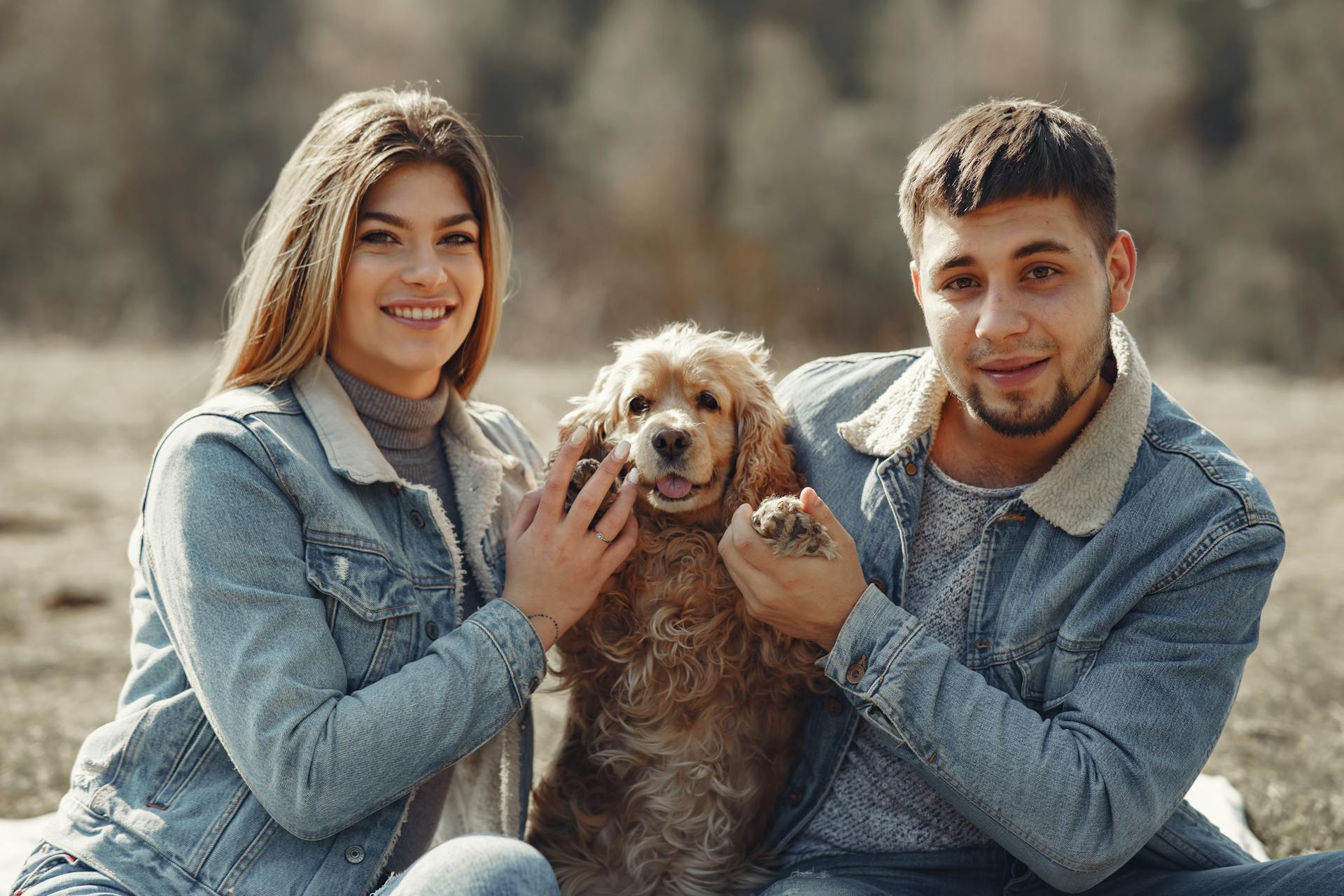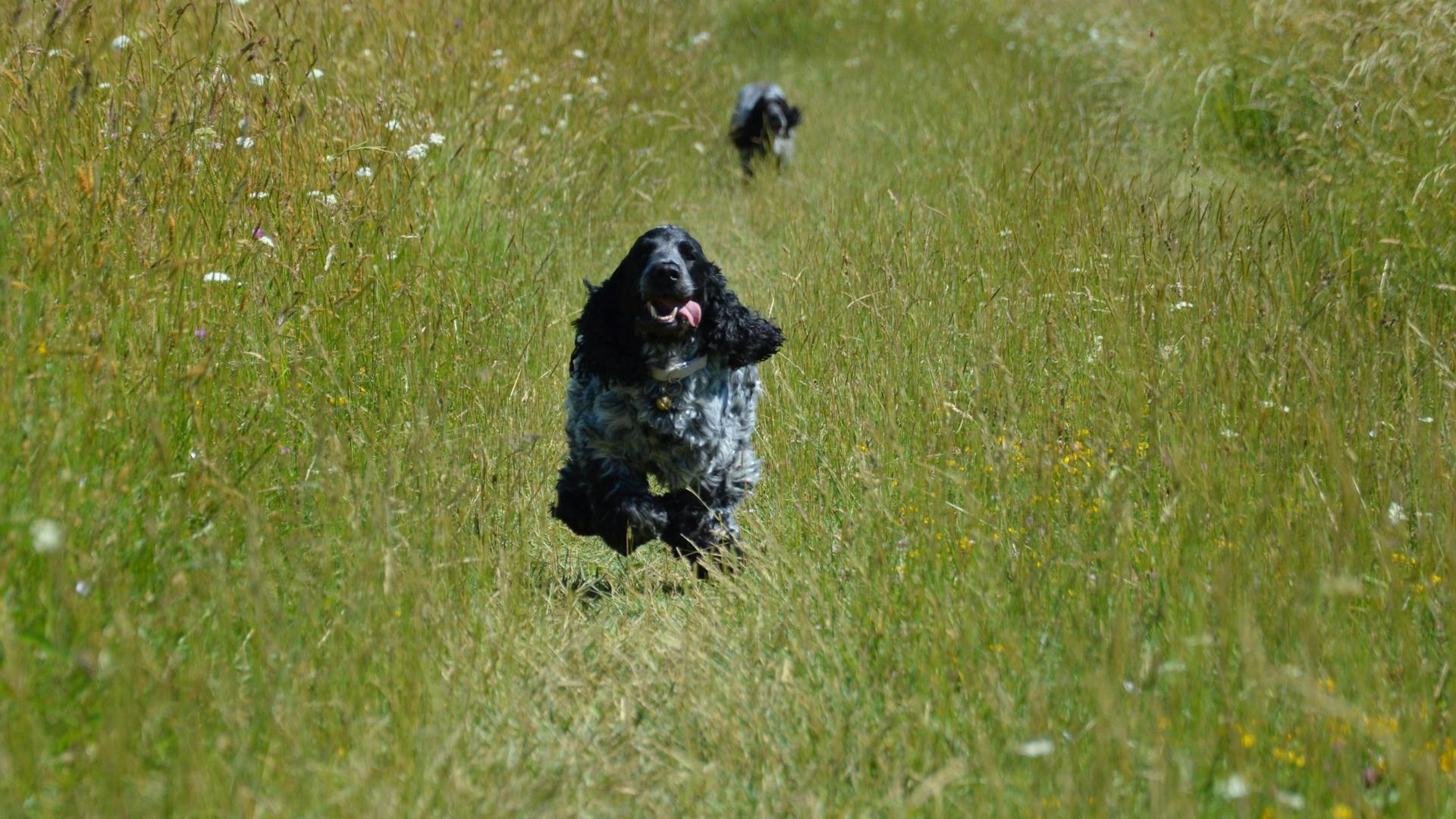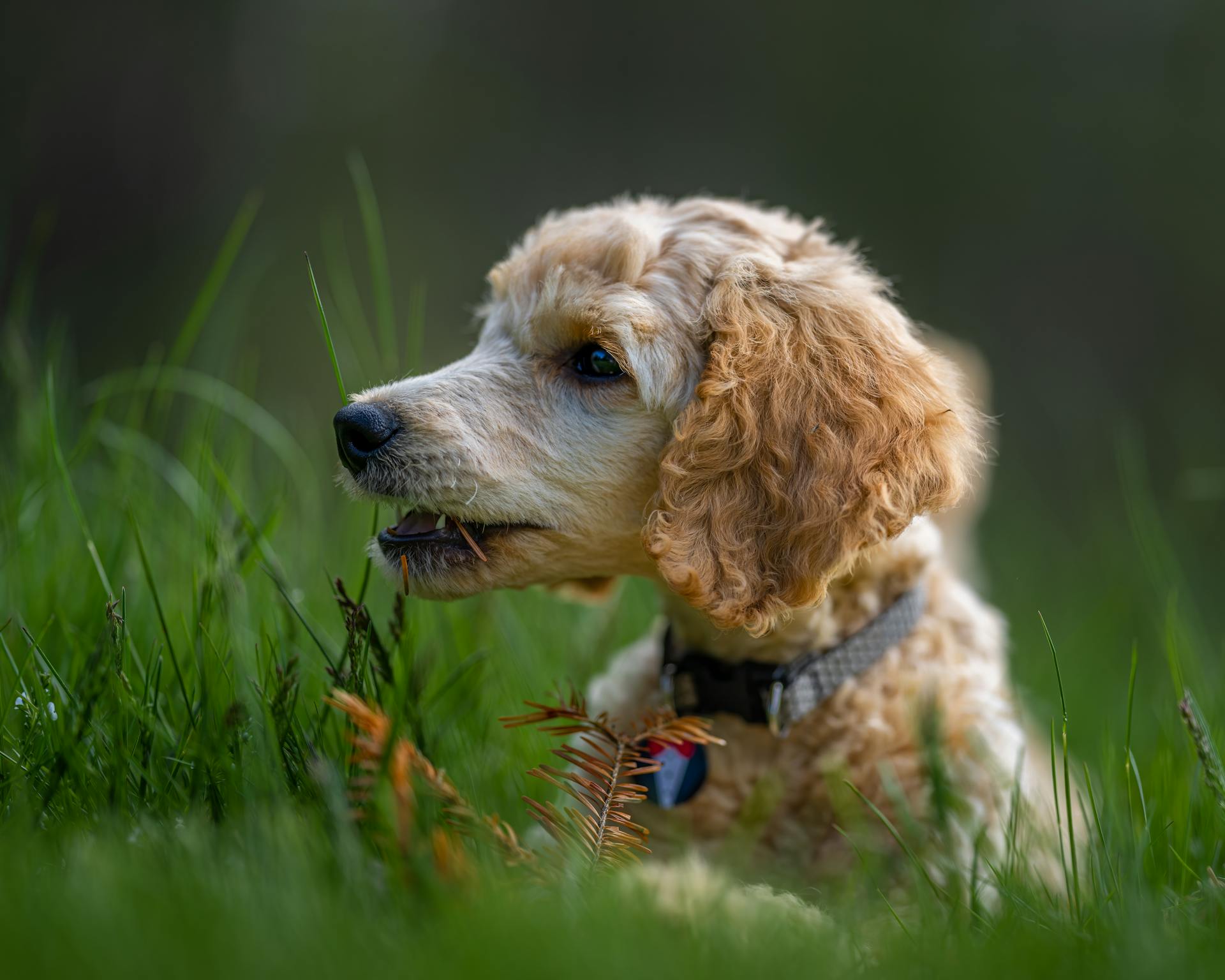
The English Cocker Spaniel is a medium-sized dog breed with a muscular build and a feathered coat that requires regular grooming.
They have a moderate energy level, which means they need daily exercise but don't require as much physical activity as some other breeds.
English Cocker Spaniels are known for their friendly, outgoing personalities and make great family pets. They are also highly social dogs that thrive on interaction with their human family members.
On average, English Cocker Spaniels live between 12-15 years, making them a long-term companion.
English Cocker Spaniel Basics
English Cocker Spaniels were originally from Spain and were used for hunting trips with humans, where they would use their sniffing abilities to trap game birds.
The breed was first differentiated into two categories: the Water Spaniel and the Land Spaniel. This distinction was made before dog shows became common, but it laid the groundwork for future breed categorizations.
As a result of their impressive hunting skills, especially with driving woodcock birds out of their hiding spots, they were named Cocker Spaniels.
Physical Traits and Characteristics
English cocker spaniels have tight eyes that are slightly oval.
Their muzzle is equal in length to their skull, which is a key physical trait that distinguishes them from American cocker spaniels. English cocker spaniel males and females are relatively close in size, with males ranging from 16 to 17 inches tall and females from 15 to 16 inches tall.
English cocker spaniels have ears set low and lying close to the head, with fine ear leather that extends to the nose. Their eyes are medium-sized, slightly oval, and set wide apart, giving them a soft and melting expression.
Breed Group
If you're interested in learning about your dog's breed group, Wisdom Panel's DNA tests can help identify whether your furry friend is an English Cocker Spaniel.
You can also discover other breeds through their DNA testing services, which provide valuable information to help you better understand your dog's heritage and characteristics.
General Appearance
The English Cocker Spaniel has a compact, sturdy, well-balanced body.
Their ears are set low and lie close to the head, making them easy to cover with long, silky hair. This unique ear structure is a key feature of their adorable expression.
English Cocker Spaniels have medium-sized eyes that are slightly oval and set wide apart, giving them a soft and melting appearance. Wide nostrils allow for proper development of scenting ability, making them skilled hunters.
Their muzzle is equal in length to their skull, setting them apart from the American Cocker Spaniel breed. This unique feature contributes to their overall physical characteristics.
Health and Wellness
English cocker spaniels are generally healthy dogs, but like all breeds, they can be prone to certain health issues.
Reputable breeders should test for health conditions and keep genetic predispositions in mind when breeding English cocker spaniels. Recommended tests include hip evaluation, patella evaluation, and PRA Optigen DNA testing.
Progressive retinal atrophy is a condition that affects your dog's ability to see at night, while familial nephropathy can cause early-onset kidney failure in young dogs. Hip dysplasia is an inherited deformity of the hips that can cause arthritis later in life, and adult-onset neuropathy causes weakness over time.
English cocker spaniels are also prone to canine distichiasis, which can cause severe eye discomfort and irritation. Cataracts and retinal dysplasia are other conditions that can affect your dog's eyes.
To keep your English cocker spaniel healthy, it's essential to have a good understanding of their specific health needs. This includes regular veterinary check-ups, proper diet, and exercise routine.
Here are some key things to remember:
- Brush your dog's teeth daily to prevent periodontal disease.
- Clean her ears weekly to prevent infections.
- Feed a high-quality diet appropriate for her age.
- Exercise your dog regularly, but don't overdo it at first.
- Keep your dog's diet consistent and avoid giving her people food.
By following these tips and being aware of the potential health issues that can affect English cocker spaniels, you can help keep your furry friend happy and healthy for years to come.
Care and Maintenance
English cocker spaniels are big shedders, so they need routine brushing and combing to keep their hair from matting and tangling.
Their double coat requires frequent nail trimming, daily teeth brushing with a dog-friendly toothpaste, and regular ear checks for excess earwax and debris. This should be done weekly to prevent infection.
To keep your English cocker spaniel happy and healthy, make sure they get plenty of exercise outside every day. They love swimming, playing fetch, and going on long hikes or walks with their owners.
Regular vaccinations are also essential; core vaccines include distemper, adenovirus, parvovirus, +/- parainfluenza, and rabies. Pet health insurance is another important step in caring for your pet to cover medical tests and procedures throughout their life.
Here are the recommended vaccinations:
- Distemper
- Adenovirus
- Parvovirus
- +/- Parainfluenza
- Rabies
Early socialization and puppy training classes are also crucial for their development, helping them become well-mannered dogs.
Maintain Your Ears
Maintain Your Ears.
Cocker Spaniels are prone to frequent ear infections, so regular checks are a must.
Their coats get dirty from playing in puddles and lakes, but it's their ears that need attention most - check them regularly to ensure they're clean and healthy.
You should brush your Cocker Spaniel's coat several times a week, making sure to include the areas around their ears.
To keep their ears in top condition, have a professional groomer strip out their coat 3 or 4 times a year.
Caring for Your Dog at Home
English cocker spaniels have a thick shiny coat that sheds often, so routine brushing and combing are essential to prevent matting and tangling.
Their double coat means they're big shedders, so be prepared for regular grooming sessions. You can use scissors, thinning shears, or a stripping tool to trim their hair, but be careful not to cut too close to their skin.
Weekly ear checks are also crucial to remove excess earwax and debris. Daily teeth brushing with dog-friendly toothpaste is another must-do to keep your furry friend's smile shining bright.
English cocker spaniels love being outdoors, so make sure they get plenty of time to run around daily. They're adaptable dogs that thrive on long hikes or walks with their owners, but don't forget to exercise their mind too! Agility, obedience training, and tracking can be great activities to stimulate their hunting instincts.
Their diet should have the right balance of main nutrient groups, including a constant supply of fresh water. Regular body condition scores will ensure your dog stays in ideal shape, so feed them at least twice daily according to their food's guidelines.
Essential Vaccines for Your Dog
Here are some core vaccines your English cocker spaniel should have:
- Distemper
- Adenovirus
- Parvovirus
- +/- Parainfluenza
- Rabies
Remember, other vaccines may be essential for your dog depending on their lifestyle and risk factors.
Pets on Furniture
Pets on furniture can be a challenge for many pet owners.
Inviting your Cocker Spaniel onto furniture is essential to establish boundaries and maintain control over cuddling. You should have some control over where they sit in your lap, otherwise they'll feel like the couch and bed are theirs and they won't have to listen to you.
Letting them cuddle with you on everything can create a power imbalance that's hard to reverse. It's essential to pick a spot where you let them sit in your lap, don't let them take over all the furniture!
Spay or Neuter
Spaying or neutering your Cocker Spaniel can decrease the likelihood of certain types of cancers.
This surgery also gives us a chance to identify and address some of the diseases your dog is likely to develop, such as identifying and addressing hip problems through X-rays or extracting puppy teeth.
Routine blood testing prior to surgery helps us to identify and take precautions for common problems that increase anesthetic or surgical risk.
Training Dogs
Training your English Cocker Spaniel requires patience and consistency.
Positive reinforcement and a gentle tone are the best way to train this breed, making them eager to please and obedient. They thrive on reward-based training methods that focus on positive interactions.
English Cocker Spaniels are very food-motivated, which can be helpful during training sessions - treats can serve as rewards for good behavior and help manage guarding tendencies.
Early socialization is also crucial in helping your dog develop into a well-mannered adult, especially when it comes to interacting with other animals.
Reward-based training can help minimize fearful behaviors that sometimes arise in English Cocker Spaniels, making them more confident and calm around new people and situations.
Cocker Spaniels are intelligent dogs who love working with their owners, so they'll enjoy participating in dog sports like agility or scent work games - this will keep their mental muscles sharp and engaged.
Health Considerations
English cocker spaniels are generally healthy dogs, but there are some health concerns to be aware of.
Progressive retinal atrophy is a condition that can affect English cocker spaniels' ability to see, with centralized progressive retinal atrophy causing loss of central vision and generalized progressive retinal atrophy affecting night vision. A DNA test can identify this condition in dogs as young as six weeks old.
Hip dysplasia is another inherited condition that can cause arthritis later in life, with weight gain exacerbating the issue. Regular evaluation and monitoring are essential to catch this condition early. Familial nephropathy, adult-onset neuropathy, canine distichiasis, cataracts, and retinal dysplasia are other health concerns specific to English cocker spaniels.
Here's a quick rundown of some common genetic health conditions in English Cocker Spaniels:
- Progressive Retinal Atrophy
- Familial Nephropathy
- Adult-Onset Neuropathy
- Canine Distichiasis
- Cataracts
- Retinal Dysplasia
Common Health Issues
English Cocker Spaniels are generally healthy dogs, but like all breeds, they can be prone to certain health issues.
One condition you should watch out for is Progressive Retinal Atrophy (PRA), which affects your dog's ability to see at night. Centralized PRA causes loss of central vision, while generalized PRA makes it hard for them to see in the dark. A DNA test can identify this condition early on.
Hip Dysplasia is another inherited deformity that affects proper hip movement and can lead to arthritis later in life. Weight gain can exacerbate the issue, so keeping your dog at a healthy weight is crucial.
Adult-Onset Neuropathy causes weakness over time, typically appearing between seven and nine years old. You may notice your dog's hind legs becoming wobbly or their front limbs weakening as well.
Other conditions to be aware of include Familial Nephropathy, which affects the kidneys and can cause early-onset kidney failure; Canine Distichiasis, which causes eye discomfort and irritation due to eyelashes affecting the eyeball surface; and Cataracts and Retinal Dysplasia, which also affect the eyes.
Some common signs of illness in English Cocker Spaniels include:
- Change in appetite or water consumption
- Tartar build-up, bad breath, red gums, or broken teeth
- Itchy skin (scratching, chewing, or licking), hair loss
- Lethargy, mental dullness, or excessive sleeping
- Fearfulness, aggression, or other behavioral changes
Special Considerations
English cocker spaniels don't do well when left alone and can get easily stressed by loud noises and rough handling.
They prefer to be inside with their people and thrive on attention from their owners. Their happy disposition makes them great for families of all ages, but they do need positive reinforcement training to prevent negative reactions.

In fact, English cocker spaniels form a strong bond with their owners that can make training easier, as long as it's done in a way that earns their respect rather than fear. They're known for being loyal and loving companions, always happy to be around people.
If socialized well when young, they'll likely get along with all kinds of people, children, dogs, and pets, but monitoring their play is still important, especially with other dogs and young children. Their small size belies a big personality that can adapt from sporting dog to loving companion.
Explore further: Water Loving Dogs for Short Nyt
Dog Allergy Awareness
Some breeds are more prone to skin allergies than others.
Cocker Spaniels are one such breed and can be susceptible to skin irritations like dermatitis, which is characterized by red, flaky, and itchy skin.
Skin irritation can spread quickly in dogs, so it's essential to catch any issues early on.
Talk to your vet about giving your dog allergy medication or topical ointments that can help ease the discomfort.
Suggestion: Allergic Reaction English Bulldog Skin Bumps
Frequently Asked Questions
What's the difference between a Cocker Spaniel and an English Cocker Spaniel?
A Cocker Spaniel is slightly longer than tall, while an English Cocker Spaniel (ECS) is taller with a squarer shape. This key difference can help you identify which breed you're looking at.
Do English Cocker Spaniels bark a lot?
English Cocker Spaniels may bark frequently if not properly trained or socialized. Early training and gentle discipline can help minimize excessive barking
Are English Cocker Spaniels good family dogs?
Yes, English Cocker Spaniels are excellent family dogs due to their friendly nature and ability to get along well with children. They also thrive on human companionship, making them a great addition to many families.
Do English Cocker Spaniels shed a lot of hair?
English Cocker Spaniels have a moderate shedding level due to their double coat. Regular grooming is recommended to prevent knots and tangles.
Can English cocker spaniels be left alone?
English Cocker Spaniels should not be left alone for more than 4 hours. Consider arranging pet-sitting or in-home care if you'll be away from home for an extended period
Sources
- https://www.webmd.com/pets/dogs/what-to-know-about-english-cocker-spaniels
- https://www.chapinvetcare.com/client-resources/breed-info/english-cocker-spaniel/
- https://www.pumpkin.care/dog-breeds/cocker-spaniel/
- https://www.purina-arabia.com/find-a-pet/dog-breeds/english-cocker-spaniel
- https://www.wisdompanel.com/en-us/dog-breeds/english-cocker-spaniel
Featured Images: pexels.com


